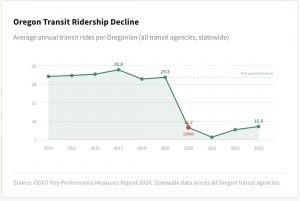Oregon chief justice deepens public defender crisis by installing ‘alternate slate of electors’
5 min read
by Rob Fisette
It becomes obnoxious to call abuses of power “Trumpian.” Using the power of the state to crush the Black and poor in the U.S. colony is bipartisan and dates back, famously, to at least 1619–truly one of its oldest and most treasured institutions. The version implemented by Trump and the Republican Party is unique primarily in its openness about the project, where most often the process happens in civil discussions between powerful people in fancy suits under cover of The Rule of Law.
This week, the latest chapter of Oregon’s public defense crisis was written in exactly this way, but the use of an “alternate slate of electors” to help write it must be considered—with my apologies—Trumpian.
Oregon has less than a third of the public defenders needed to provide constitutionally appropriate minimum public defense for all of the indigent poor who are prosecuted in the state. The state is deficient 1,296 full-time-equivalent (FTE) attorneys and has only 31% of the attorneys it needs, according to a study published by the American Bar Association in January.
We are not talking about putting up a great defense, but only the absolutely minimum defense so as to not itself be illegal and to give the full illusion of equal power and due process.
This crisis has developed through structural issues with how Oregon’s public defense system hires and pays for public defense services, years of underfunding, and over-prosecuting the poor. Over 90% of those prosecuted in Oregon cannot pay for defense.
This shortage of public defenders, combined with a deep love of crushing the poor, has led to nearly 1,000 neighbors at any given time without counsel, many languishing in jail pre-trial without an attorney.
I do not wish to invest too much in “innocence,” but the mythology of our punishment system is that those in jail pre-trial are “presumed innocent” people locked away from their families and children, unable to afford an advocate to investigate their case or help get them out or pay bail (recall: poor). Those not in jail without attorneys lose critical time to investigate their cases before exculpatory evidence disappears.
Prosecutors’ offices are complicit in this heinous violation. The Lane County DA is bloodthirsty, recently losing a fight against the governor to prevent the use of clemency for children sent to die in Oregon prisons. Despite knowing for years that our neighbors are chained in cages away from their children only because they cannot afford an attorney or make a cash payment to gain release, it was only recently that she decided to stop prosecuting certain cases because she considers HER office understaffed
Defendants lacking legal support is actually a fine situation generally for the DA’s office and city prosecutors whose job is to issue convictions, since people who sit in jail unable to hug their children for even one day, let alone days weeks, months are often “happy” to plead guilty for time served to get back to their loved ones, often accepting other non-jail punishments (like time on the sheriff’s work crew) as well.
The judiciary is complicit in this heinous violation. At any time they could recognize the harm being done to those who the system has withheld legal support from and dismiss charges against those who cannot be timely assigned an attorney or at least intervene for their pre-trial release.
The Chief Justice of the Oregon Supreme Court, Martha Walters (a “nonpartisan” Democrat), has been on the Supreme Court since 2006—16-plus years of complicity. In an ostensible attempt to quell the public defense crisis, Walters issued a memo earlier this year calling on any member of the State Bar to come help out by doing public defense as a side hustle.
Do you spend most of your days writing wills? Litigating to overturn or maintain EPA regulations? Arguing that the person who broke the sewer line is (or is not) REALLY responsible for paying to repair the broken sewer line? Don’t worry. No experience, knowledge, or special skill necessary. Just come be a public defender; after all, the defendants can’t pay and should be happy with anything they get for free, even as their entire lives are at stake.
This brings us to Oregon’s Office of Public Defense Services (ODPS), which is the public agency which manages the public defense system in Oregon (though they do not employ the public defenders). One year ago, ODPS hired a new executive director, Steve Singer, to help steer the crisis. Chief Justice Walters has full control over membership on the Public Defense Services Commission (PDSC), a group which controls ODPS like a board of directors.
In a 2019 report, the Sixth Amendment Center identified this exact structure with the judiciary in full control of public defense as a conflict of interest and contrary to national standards, to wit: “[N]ational standards call for states to create independent statewide commissions in which members are selected by diverse appointing authorities, so that no single branch of government has the ability to usurp power over the chief defender or exert outsized influence over the delivery of public defense services.”
Which catches us up to last week, when the following remarkable string of events unfolded.
Aug. 10: The PDSC held a hearing during which they considered whether to fire Singer. Walters spoke strongly in favor of firing him. But the commission deadlocked 4-4 on the issue, and he was not fired.
Aug. 15: Walters dissolved the entire commission.
Aug. 16: Walters appointed the new commission. All four commissioners who voted to fire Singer were kept, plus one who voted not to fire, plus four new commissioners. They immediately called an executive session to discuss the performance of the ODPS executive director.
Aug. 18: The reconstituted commission voted 6-2 to fire Singer.
So, the crisis continues, with almost all of the same actors in the all of the same roles, wearing the same fancy suits, but with a new vacuum atop ODPS. But okay, the city does like a full Sheriff’s work crew for park maintenance without the added inconvenience of salaries and benefits, so…yay?
Rob Fisette lives in Southeast Eugene.







